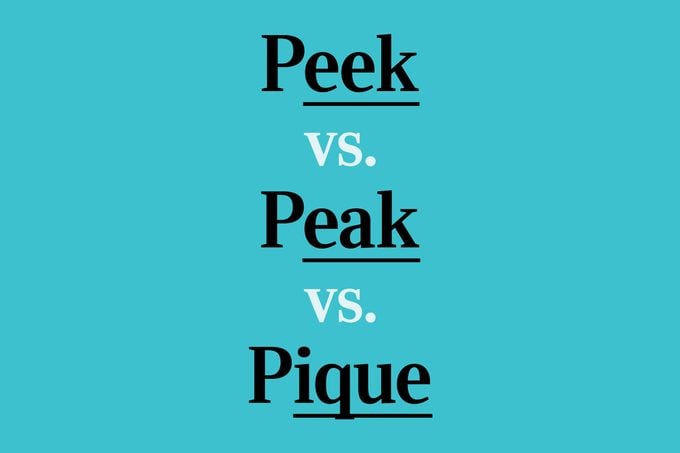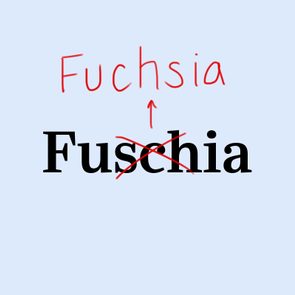“Peek” vs. “Peak” vs. “Pique”: Here’s How to Use Them the Right Way
Updated: Jun. 06, 2023
Peek, peak and pique all sound the same, so here's how and when to use them correctly

Is it okay to take a peek at that diary hidden in the sock drawer? Or should you take a peak? When to use peek vs. peak can be tricky—and for that matter, what about pique? (Maybe you’re even feeling piqued for not knowing the answer.) Homonyms like stationary vs. stationery or elicit vs. illicit can even trip up spell check and autocorrrect. And don’t even get us started on the loose vs. lose issue.
The ever-confounding English language often swings with just a letter or two. In this case, peaking vs. peeking have distinctly different meanings. And the word pique has another etymological heritage entirely. All three are reminiscent of discreet vs. discrete, and to some degree, flush out vs. flesh out too. When you say these words aloud, all is good. But written on the page, knowing the difference between them requires precision.
Since parsing pronunciation and grammar has always piqued my interest, here’s a rundown on how to use these three words.
Get Reader’s Digest’s Read Up newsletter for more grammar, cleaning, travel, tech and fun facts all week long.
What does peek mean?
The 14th-century English peek means to take a look, sometimes in a furtive manner to avoid detection. It can be used as a noun, as in a quick peek, but peek is also a verb. According to vocabulary.com, peek derives from piken. Historically, peek had two synonyms: keek, which lasted until the 15th century, and peep, which is still used today. Note the double “e” in every iteration? Just like two eyeballs shifting surreptitiously.
Examples of peek in a sentence
- Dorothy took a quick peek behind the curtain to see the wizard and was shocked to find an ordinary man.
- Most new parents who want to sleep-train their babies peek into the nursery too soon.
- The hairstylist asked her client if she wanted to peek at her hair color before a blow-dry.
What does peak mean?
The word peak suggests both the top of a mountain and the height of an accomplishment. Etymonline defines it as “pointed top” or “projecting summit.” This noun dates back to the 16th century, but in modern usage, it can also be used as a verb. For example, ocean waves can peak 20 feet during a storm.
Examples of peak in a sentence
- Although the artist is 72 years old, the volume and quality of his work shows he’s at the peak of his career.
- The secret to making great meringue is separating the egg yolks and whipping the whites into stiff, glossy peaks.
- The only way to mold a mohawk haircut into a stiff peak is with plenty of waxy product.
What does pique mean?
This word doesn’t look the same as the other two—so you’re less likely to confuse peak vs. pique or pique vs. peak, but it is pronounced just the same. Unlike the English origins of peak and peek, pique has French roots. Originally, the verb piquer meant “to prick or irritate,” and just about every iteration of this word in the romance languages (Italian, Spanish, Portuguese, etc.) traces back to something sharp, or a way to puncture. As a noun, it indicates a quick response to a perceived slight, as opposed to simmering anger. But pique doesn’t always carry a negative connotation as a noun. It may simply mean your curiosity is aroused.
Examples of pique in a sentence
- After I shared an idea with a colleague, it piqued his interest in supply-chain issues.
- Never laugh at a toddler in a fit of pique, since it may make matters worse.
- Reading a historical novel about the Civil War piqued his curiosity about the Deep South.
Tricks for remembering peak vs. peek vs. pique
For the first two, when in doubt about using peaked vs. peeked, think about the vowels. One easy way to remember is that peAk looks like it has a mountain in the middle. Pique is in a different category, so thinking about the French ending can help you remember that the noun usage of the word suggests a soupçon of emotion.
If all else fails, recall the common game we play with babies: peek-a-boo. It is a game of hiding your eyes. This should be helpful if you’re a person who fears grammatical mistakes that make you look bad.
Peek vs. peak vs. pique: Test your knowledge!
Sources:
- Vocabulary.com: “Peek”
- Etymonline: “Peak”
- Merriam-Webster: “Pique”





















